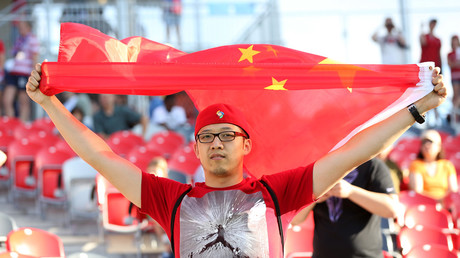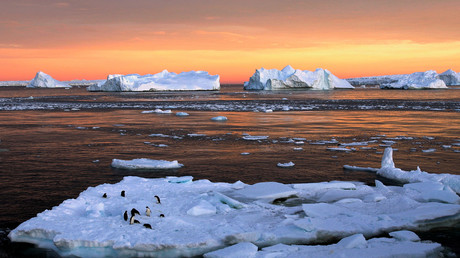‘Sri Lanka in political turmoil while US, China, India fight for island with strategic location’
The US will likely work closely with India to counter China’s growing influence in the Indo-Pacific region by reigning in the political coalition of new Sri Lankan PM and president, professor Pak Nung Wong told RT.
Political upheaval in Sri Lanka turned deadly on Sunday when a sacked cabinet minister’s (Ranil Wickremesinghe) bodyguard fatally shot one person and injured others. It came after the president abruptly sacked the prime minister and suspended parliament, sparking a constitutional crisis.
While supporters of the ex-prime minister gathered outside his official residence denouncing the changes, Sri Lankan President Maithripala Sirisena said the sackings were over an alleged plot to assassinate him.
“Since I have a majority, I remain as the Prime Minister and I will function as the Prime Minister,” former Prime Minister of Sri Lanka Ranil Wickremesinghe said.
The ousted prime minister is known for his pro-American views, and the newly sworn-in Mahinda Rajapaksa, who was the president before Sirisena, has pro-China interests.
RT spoke to Dr. Pak Nung Wong, a senior lecturer at the Department of Politics, Languages and International Studies (PoLIS) at the University of Bath, UK, who believes that Sri Lanka is being torn apart between major global powers.
He explained that Sri Lanka’s location in the Indian Ocean is politically sensitive; it connects the key commercial and energy waterways going to Europe, Africa, and Asia which hold the life lines of many countries.
“Despite South Asia has been dominated by India, China has recently gained important strategic footholds in Sri Lanka, Bangladesh and Pakistan and also countries in the East African coast,” he explained.
Pak Nung Wong said that “Sri Lanka’s India-backed Tamil separatist war ended up in 2009 after China supported the Sinhalese government to successfully pacify the insurgency. Being the key regional ally of India, the US stopped arms sales to Sri Lanka and was very critical of the human rights record of its counter-insurgency program.”
He said that Japan also joined the geopolitical game “by forging an alliance with India and the US in countering China’s growing influence in the entire Indo-Pacific region.”
In the 2015 presidential election, pro-China president Mahendra Rajapaksa was defeated by his rival and ex-aide Maithripala Sirisena.
Sri Lanka – as a small country in the Indian Ocean – would like to diversify its diplomacy without having to depend too much on India and not being influenced by it too much. The approach to the US, Japan and China is a natural consequence of these attempts. But at the same time Sri Lanka needs money to build its infrastructure… and China happens to be an important and sympathetic lender. Naturally, Sri Lanka would like to take part actively in One Belt One Road initiative on the part of China and it hopes to secure loans in support of infrastructure projects to promote its economic development. – Joseph Cheng, professor and political analyst from Hong Kong City University
According to Pak Nung Wong, “although Sirisena was originally critical of China’s position and policy in Sri Lanka, he later on shifted to China and gained substantial financial support from Beijing. The reason of the removal of pro-US and pro-India PM Ranil Wickremesinghe by Sirisena is a very important move to restore Mahendra Rajapaksa to be the Prime minister.”
He said there could be several implications: “As Wickremesingheby is Tamil, his removal has triggered inter-ethnic tensions between the Tamil and the Singhalese groups.”
As Wickremesinghe refused to step down, Pak Nung Wong suggested that having two persons as the prime minister would mean a constitutional crisis and perhaps military involvement to calm the situation.
“Finally, both Sirisena and Rajapaksa are pro-China. They would naturally solicit political and military support from Beijing in order to neutralize the threat posed by the US-backed Wickremesinghe. If the situation was not handled properly by these parties, a China-US with India-proxy war would again break out in Sri Lanka,” he claimed.
In Pak Nung Wong’s opinion, it is unlikely that under US President Donald Trump’s ‘America First Policy’, Washington “will get itself too deeply involved in this scenario.”
What is likely is that Washington will work more closely with India “to try and reign in the new political coalition formed by Rajapaksa and President Sirisena.”
Pak Nung Wong said that under the ‘One Belt One Road’ Initiative, Sri Lanka has been identified as a key strategic location and hub for China to connect its energy supply from Africa and the Middle East to China.
“Also China has been building… ports, including in Colombo, in order to diversify the geopolitical risk that it has in the region. One of the main risks that it has in the region has to do with its competition with India and the US.”
Think your friends would be interested? Share this story!







Comments are closed.